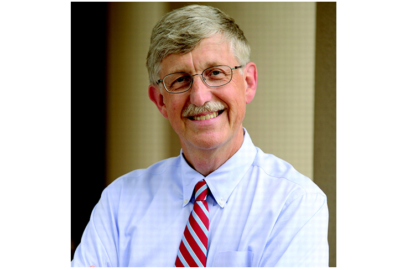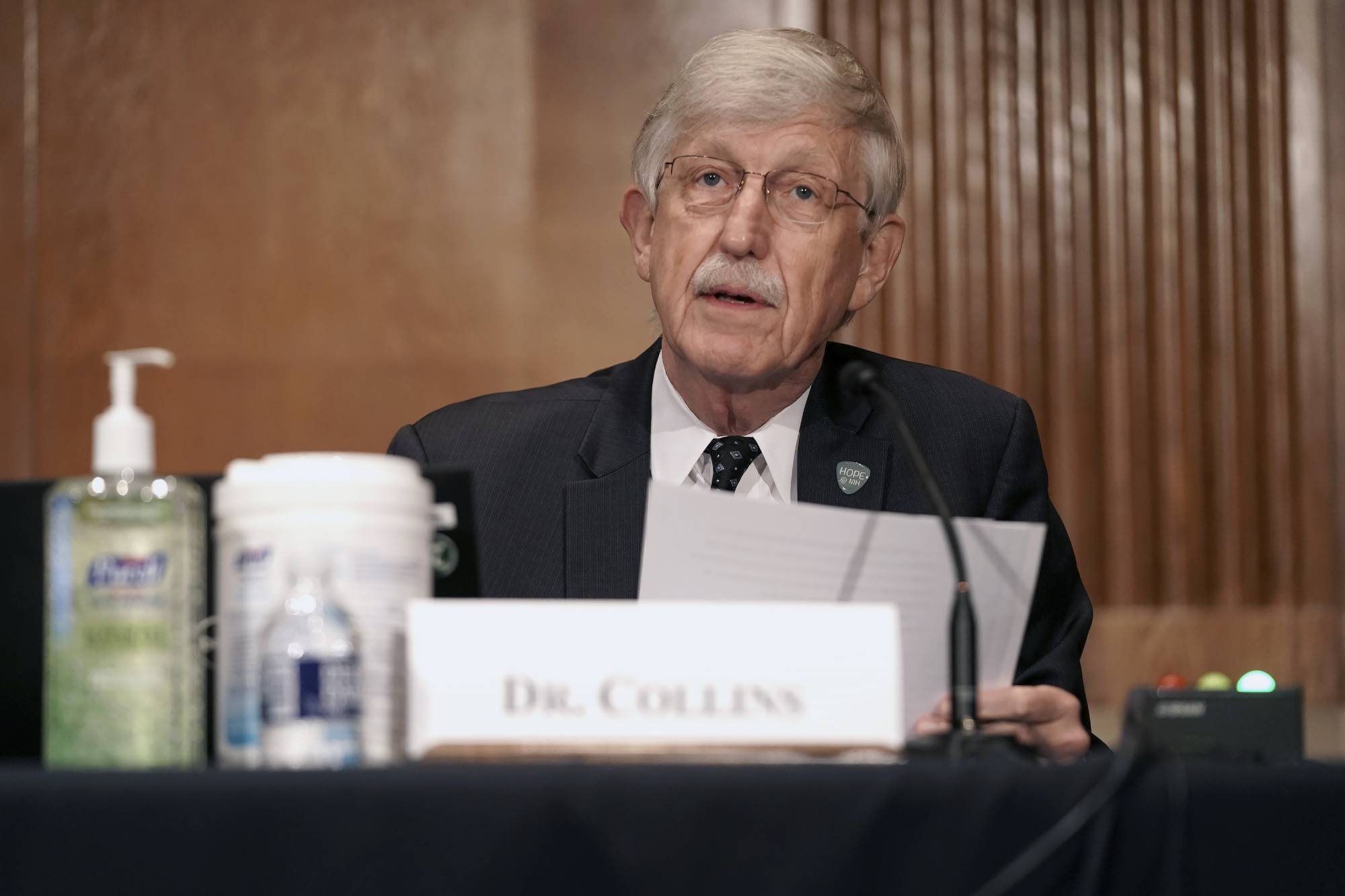Hubbard Radio Washington DC, LLC. All rights reserved. This website is not intended for users located within the European Economic Area.
One of the nation’s top public health officials is calling it a career
In today's Federal Newscast, Dr. Francis Collins says he'll leave his post as director of the National Institutes of Health by the end of the year.
To listen to the Federal Newscast on your phone or mobile device, subscribe in PodcastOne or Apple Podcasts. The best listening experience on desktop can be found using Chrome, Firefox or Safari.
- He’s helped steer the nation’s response to two global outbreaks. Now one of the top federal docs is about to call it a day. Dr. Francis Collins said he’ll leave his post as director of the National Institutes of Health by the end of the year. Appointed by President Barack Obama in 2009, he’s overseen the NIH response to the Ebola virus abroad and COVID-19 pandemic here in the U.S. A noted geneticist and human genome mapper, Collins is also a folk singer, motorcyclist and the longest-serving NIH director yet.
- Federal employees’ and Postal Service workers’ compensation claims are taking longer to process because of the pandemic. A new Labor Department inspector general report found the Office of Worker’s Compensation saw their ability to process claims in a timely manner drop by 15% during the first five months of the pandemic. At the same time, OWC received more than 2,800 claims, including 48 death claims, due to COVID-19 between March and August 2020. The IG said that while the office improved claim processing over the following seven months, it found 46% of COVID claims remained open as of March.
- Federal employees get more details on requesting a medical or religious exception to the vaccine mandate. The Biden administration said agencies will consider sincere religious beliefs, not political opinions, as possible reasons for not complying with the vaccine mandate. But a religious or medical claim alone may not grant an employee a reasonable accommodation. Agencies will consider the nature of an employee’s job and other factors when considering possible exemptions to the vaccine mandate. The administration recently clarified, employees who already had COVID-19 must get the vaccine too. (Federal News Network)
- The Department of Veterans Affairs is making a few changes to help veterans better coordinate their care at the agency and in the private sector. Most of the changes will occur within VA internally. The department will first reorganize the community care program’s financial functions within the Veterans Health Administration’s larger finance offices. It will also consolidate two VA community care offices. The changes stem from a 2020 internal review of VA’s clinical, administrative and financial operations inside the community care program.
- A commission in charge of renaming military bases is getting a lot of feedback. In the wake of the death of George Floyd, Congress created a panel to consider changing military base names that honored Confederate officials. The Naming Commission asked for public opinion on what the bases should be called and the public delivered. The commission received more than 27,000 submissions. About 5,000 of those were duplicates. Submissions included Master Sgt. Roy Benavidez, who received the Medal of Honor for his efforts in Vietnam, and Gen. William Sherman, who routed Confederates in the Civil War.
- A new audit gives the military services high marks for how they’ve used a new procurement method Congress authorized in 2016. The “middle tier” of acquisition lets officials use a streamlined process, as long as they can deliver a prototype or fielded weapons system within five years. The DoD inspector general said the 11 MTA programs it examined used the new structure appropriately and embraced a culture change. DoD is using the new acquisition pathway for 69 separate weapons systems, valued at more than $30 billion.
- The Senate confirmed Air Force General Jacqueline Van Ovost as the head of U.S. Transportation Command. Van Ovost is the first woman to head TRANSCOM. She previously led Air Mobility Command where she oversaw more than 100,000 military and civilian personnel. Van Ovost also helped with the humanitarian evacuation in Afghanistan. She will replace Army General Stephen Lyons.
- The Defense Information Systems Agency is reimagining its approach to provide cloud and data center services. DISA ompleted its latest reorganization by bringing together the Cloud Computing Program Office and its Services Directorate and Ecosystem to create the Hosting and Compute Center. Sharon Woods is the acting director of the HCC. “Let’s make sure that global fabric is in place that has both on-prem and off-prem capabilities so mission owners have the diversity and optionality that they need, and then for the Department of Defense, we need resiliency and speed,” Woods said. She added that bringing all of these services under one umbrella will make it easier for DoD to take advantage of these capabilities to meet mission goals.
- The Cybersecurity and Infrastructure Security Agency would have to define systemically important critical infrastructure under a new bill in the House. Reps. John Katko (R-N.Y.) and Abigail Spanberger (D-Virg.) introduced the legislation this week. It would also require CISA to provide the owners and operators of that critical infrastructure with optional cybersecurity services. The lawmakers said the government needs to better prioritize what critical infrastructure is most important to economic and national security.
- Senate lawmakers want companies to tell the government when they make a ransomware payment. New legislation in the Senate would give companies and other organizations 48 hours to report a ransomware payments to Department of Homeland Security. Individuals would not be subject to the requirements. Sen. Elizabeth Warren (D-Mass.) said the government lacks critical data to go after cyber criminals. The bill would require DHS to set up a website for reporting information about ransomware payments and other information associated with the attack. It would also have DHS conduct a study on commonalities among ransomware attacks and the extent to which cryptocurrency facilitated these attacks.
- The White House Office of Science and Technology Policy seeks feedback on how agencies can promote advanced manufacturing in the U.S. This includes the production of IT, cybersecurity, and automation products. OSTP is asking how federal research and development centers can accelerate the growth of this industry, and which technologies will have the biggest impact on global competitiveness. It’s also asking how agencies can support small businesses in this field, and increase the overall security of the supply chain. OSTP will accept comments through Dec. 17.
- The National Security Commission on Artificial Intelligence is no more, but a new organization is taking its place. The commission’s former chairman, and former Google CEO Eric Schmidt, is standing up a new group focused on the U.S.’s readiness for AI and other emerging technology. The board for the Special Competitive Studies Project includes former Deputy Defense Secretary Robert Work, former Undersecretary of Defense for Policy Michele Flournoy, and former chairman of the House Armed Services Committee Mac Thornberry (R-Texas). The project is modeled after a panel stood up to counter national security threats during the Cold War.
Copyright © 2024 Federal News Network. All rights reserved. This website is not intended for users located within the European Economic Area.
Eric White
Eric White is news anchor and Federal Drive producer at Federal News Network.
Follow @FEDERALNEWSCAST
Related Stories
Related Topics
All News
compensation
Covid-19
COVID-19 vaccine mandate
Cybersecurity and Infrastructure Security Agency
Defense Information Systems Agency
Department of Homeland Security
diversity equity inclusion and accessibility
Federal Drive
Federal Newscast
Francis Collins
Management
military bases
National Institutes of Health
Office of Science and Technology Policy
People
Postal Service
ransomware
systemic racism
Tom Temin
Transcom
Related Stories
-
“Culture Wars Are Killing People”: NIH Director Dr. Francis Collins on Politics and Harm to Pandemic Science Conversations on Health Care
-
Thousands of feds apply for coronavirus workers’ compensation Federal Newscast





